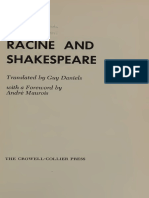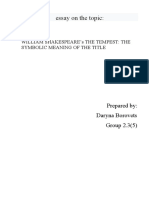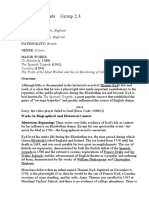Daryna Borovets Group 2.3: Pierce Penilesse His Supplication To The Divell (1592), A Satire Focused On The
Daryna Borovets Group 2.3: Pierce Penilesse His Supplication To The Divell (1592), A Satire Focused On The
Uploaded by
Daria BorovetsCopyright:
Available Formats
Daryna Borovets Group 2.3: Pierce Penilesse His Supplication To The Divell (1592), A Satire Focused On The
Daryna Borovets Group 2.3: Pierce Penilesse His Supplication To The Divell (1592), A Satire Focused On The
Uploaded by
Daria BorovetsOriginal Description:
Original Title
Copyright
Available Formats
Share this document
Did you find this document useful?
Is this content inappropriate?
Copyright:
Available Formats
Daryna Borovets Group 2.3: Pierce Penilesse His Supplication To The Divell (1592), A Satire Focused On The
Daryna Borovets Group 2.3: Pierce Penilesse His Supplication To The Divell (1592), A Satire Focused On The
Uploaded by
Daria BorovetsCopyright:
Available Formats
Daryna Borovets Group 2.
Thomas Nashe, Nashe also spelled Nash, (born 1567, Lowestoft, Suffolk, Eng.—
died c. 1601, Yarmouth, Norfolk?), pamphleteer, poet, dramatist, and author
of The Unfortunate Traveller; or, The Life of Jacke Wilton (1594), the
first picaresque novel in English.
Nashe was educated at the University of Cambridge, and about 1588 he went
to London, where he became associated with Robert Greene and other professional
writers. In 1589 he wrote The Anatomie of Absurditie and the preface to
Greene’s Menaphon. Both works are bold, opinionated surveys of the
contemporary state of writing; occasionally obscure, they are euphuistic in style
and range freely over a great variety of topics.
In 1589 and 1590 he evidently became a paid hack of the episcopacy in the
Marprelate controversy and matched wits with the unidentified Puritan “Martin.”
Almost all the Anglican replies to Martin have variously been assigned to Nashe,
but only An Almond for a Parrat (1590) has been convincingly attributed to him.
He wrote the preface to Thomas Newman’s unauthorized edition of Sir Philip
Sidney’s Astrophel and Stella (1591). Though Nashe penned an extravagant
dedication to Sidney’s sister, the countess of Pembroke, the book was withdrawn
and reissued in the same year without Nashe’s foreword.
Pierce Penilesse His Supplication to the Divell (1592), a satire focused on the
seven deadly sins, was Nashe’s first distinctive work. Using a free
and extemporaneous prose style, full of colloquialisms, newly coined words, and
fantastic idiosyncrasies, Nashe buttonholes the reader with a story in which a need
for immediate entertainment seems to predominate over any narrative structure or
controlling objective. Having become involved in his friend Greene’s feud with the
writer Gabriel Harvey, Nashe satirized Harvey and his brothers in Pierce and then
joined the combat in an exchange of pamphlets with Harvey, Strange
Newes (1592) and Have with You to Saffron-Walden (1596). If Harvey is to be
credited, Nashe was a hack for the printer John Danter in 1593. The controversy
was terminated in 1599, when the archbishop of Canterbury ordered that “all
Nasshes bookes and Doctor Harveyes bookes be taken wheresoever they maye be
found and that none of theire bookes bee ever printed hereafter.”
Apparently Nashe wrote Strange Newes while he was living at the home of
Sir George Carey, who momentarily relieved his oppressive poverty.
In Christs Teares over Jerusalem (1593), Nashe warned his countrymen during
one of the country’s worst outbreaks of bubonic plague that, unless they reformed,
London would suffer the fate of Jerusalem. The Terrors of the Night (1594) is
a discursive, sometimes bewildering, attack on demonology.
Pierce Penilesse excepted, Nashe’s most successful works were his
entertainment Summers Last Will and Testament (1592, published 1600); his
picaresque novel The Unfortunate Traveller; or, The Life of Jacke Wilton; Dido,
Queen of Carthage (1594; with Christopher Marlowe); and Nashes Lenten
Stuffe (1599). The Unfortunate Traveller is a brutal and realistic tale of adventure
narrated with speed and economy. The book describes the travels through
Germany and Italy of its rogue hero, Jacke Wilton, who lives by his wits and
witnesses all sorts of historic events before he is converted to a better way of
life. Lenten Stuffe, in praise of herrings, contains a charming description of the
town of Yarmouth, Norfolk, a herring fishery. Nashe retreated to Yarmouth when
he and Ben Jonson were prosecuted as a result of their satirical play The Isle of
Dogs (1597).
Nashe was the first of the English prose eccentrics, an extraordinary inventor of
verbal hybrids. The Works were edited by R.B. McKerrow, 5 vol. (1904–10;
reprinted and reedited by F.P. Wilson, 1958).
The Unfortunate Traveller.
All this pamphleteering work, however, was completely overshadowed by his
picaresque novel The Unfortunate Traveller or the life of Jack Wilton, which
appeared in 1594, and which was the most remarkable work of its kind before
the time of Defoe. It relates the lively adventures of the rogue-hero, an
English page, who wanders abroad, and comes into contact with many kinds
of society. He enters taverns and palaces, makes acquaintance with people
worthy and unworthy, and so passes in review the Germany and Italy of his
day. The scene opens in the English camp before Tournay, where the page is
engaged in his knavish tricks. He terrifies, for instance, a dull army victualler
into distributing his stores, so that the army had “syder in boules, in scuppets
and in helmets … and if a man would have fild his bootes, there hee might
have had it.” Such a humorist became, perforce, a traveller, and he first
appears at Münster in time to enjoy the conflict between the emperor and the
anabaptists; then, in the service of the earl of Surrey, he makes for Italy.
Passing through Rotterdam, the two travellers meet with Erasmus and Sir
Thomas More; they witness at Wittenberg an academic pageant and the old
play Acolastus, besides solemn disputations between Luther and
Carolostadius, and, finally, they strike up an acquaintance with the famous
magician, Cornelius Agrippa. At Venice, Jack elopes with a magnifico’s
wife, but is overtaken once more by the earl at Florence, where the latter
enters a tournament on behalf of his English lady-love Geraldine. 33 The
page then moves on alone to Rome, where he remains for a short period in an
atmosphere of plague, robbery and murder, and, having learned, both by
experience and hearsay, the gruesome horrors of the place, he finally leaves
the “Sodom of Italy” for the less lively scenes of his own country.
The form of this work, in the first place, is of great interest, for it resembles 51
the picaresque type indigenous to Spain. But this need not imply that Nashe
was a mere imitator; on the contrary, though he may have derived a definite
stimulus from Lazarillo de Tormes, the elements of his work represent a
spontaneous English growth. The Spanish rogue-novel was the outcome of a
widespread beggary brought about by the growth of militarism and the
decline of industry, by the increase of gypsies and the indiscriminate charity
of an all-powerful church. Similar social conditions prevailed in Elizabethan
England, though from different causes, and the conditions which
produced Lazarillo produced The Unfortunate Traveller. It has, moreover,
been shown that, while Lyly and Sidney were indebted to Spain for certain
elements in their works, yet the ultimate origins of English courtesy-books
and of the Euphuistic manner, were wholly independent of Spanish influence.
And so, in general, it may be said, that parallels existing between the Spanish
and English literatures of the time were the result of similar national
conditions, of influences which were common to both. 34 In each case, the
English development was later than the Spanish but not due to it. Moreover,
as regards Nashe in particular, the matter and design of his novel would be
quite naturally suggested by the material of his pamphlets, and, possibly, by
reminiscences of his travels; while his choice of the realistic form is partly
accounted for by his strongly expressed scorn of romances in general, as “the
fantasticall dreams of those exiled Abbie lubbers [the monks].”
When compared with the Spanish picaresque type, The Unfortunate
Traveller will be found to possess many points of similarity. There is the
same firm grasp of the realities of life, the same penetrating observation and
forceful expression; there are the same qualities of humour and satire, the
same rough drafts of character-sketches; and the aim is that of entertainment
rather than reform. From the picaresque novel, however, it diverges in its
English mixture of tragedy with comedy, and, again, in the fact that the
animating impulse of its rogue-hero is not avarice but a malignant and
insatiable love of mischief. The Spanish picaro, also, generally belonged to
the lowest class and was wont to confine his attentions very largely to
Spanish society, but Jack Wilton, a page, moves further afield and reviews no
less expansive a scene than that of western Europe in the first half of the
sixteenth century.
You might also like
- Washington IrvingDocument8 pagesWashington IrvingAroa Gomez GarciiaNo ratings yet
- BFSU BookListDocument9 pagesBFSU BookListMischa SmirnovNo ratings yet
- The Little Magazine - Amrita Pritam - Wild FlowerDocument2 pagesThe Little Magazine - Amrita Pritam - Wild FlowerIshmeet Khiala100% (1)
- Legacy - Life Among The Ruins (2nd Edition) - Worlds of Legacy - Rhapsody of Blood - PlaybooksDocument15 pagesLegacy - Life Among The Ruins (2nd Edition) - Worlds of Legacy - Rhapsody of Blood - PlaybooksDarky Dragon100% (1)
- Arts Integration Dance Poetry Weather PlanDocument3 pagesArts Integration Dance Poetry Weather Planapi-461460464No ratings yet
- Design Report v1.2Document175 pagesDesign Report v1.2JILLIAN GONZALESNo ratings yet
- Towards 2020 ScienceDocument86 pagesTowards 2020 Sciencespn100% (4)
- Christopher Marlowe Complete Works – World’s Best Collection: 50+ Works - All Poems, Poetry, Plays, Elegies & Biography Plus ‘It Was Marlowe: The Shakespeare Marlowe Conspiracy'From EverandChristopher Marlowe Complete Works – World’s Best Collection: 50+ Works - All Poems, Poetry, Plays, Elegies & Biography Plus ‘It Was Marlowe: The Shakespeare Marlowe Conspiracy'No ratings yet
- English Renaissance Writers3Document21 pagesEnglish Renaissance Writers3Davor SadikovićNo ratings yet
- Letteratura Inglese Scritto Bertinetti PDFDocument36 pagesLetteratura Inglese Scritto Bertinetti PDFSophia ConticelloNo ratings yet
- Bertinetti in Italiano e IngleseDocument29 pagesBertinetti in Italiano e IngleseArianna TafuroNo ratings yet
- English LiteratureDocument16 pagesEnglish LiteratureParvez Ahamed100% (6)
- Notes On History of English LiteratureDocument3 pagesNotes On History of English LiteratureArusharko BanerjeeNo ratings yet
- Whole British Literature SlidesDocument110 pagesWhole British Literature Slidesİlayda Uyar100% (1)
- English Novel - Lecture.Document9 pagesEnglish Novel - Lecture.Philip SesayNo ratings yet
- English Novel: Early Novels in EnglishDocument8 pagesEnglish Novel: Early Novels in EnglishphillipeNo ratings yet
- University Wits and Influence On ShakespeareDocument11 pagesUniversity Wits and Influence On ShakespeareJit BhattacharyaNo ratings yet
- University WitsDocument6 pagesUniversity WitsSiddhartha Singh100% (2)
- Casanova's Life and Times: Living in the Eighteenth CenturyFrom EverandCasanova's Life and Times: Living in the Eighteenth CenturyNo ratings yet
- La Literatura Medieval de Transmisión Oral - La Leyenda Artúrica. G. Chaucer - Los Cuentos de Canterbury.Document6 pagesLa Literatura Medieval de Transmisión Oral - La Leyenda Artúrica. G. Chaucer - Los Cuentos de Canterbury.Lorena GonzálezNo ratings yet
- Aliah' AssignmentDocument3 pagesAliah' AssignmentSean CampbellNo ratings yet
- The Middle Ages English Literature (1066-1485)Document7 pagesThe Middle Ages English Literature (1066-1485)Anara AlimbayevaNo ratings yet
- One novel...a lot of Novels: brief history of the novel in English languageFrom EverandOne novel...a lot of Novels: brief history of the novel in English languageNo ratings yet
- Estudiar MurgaDocument6 pagesEstudiar MurgaItzel EstradaNo ratings yet
- Course 7 The Poets: The Younger Generation George Gordon Byron 1788-1824Document5 pagesCourse 7 The Poets: The Younger Generation George Gordon Byron 1788-1824Raducan Irina FlorinaNo ratings yet
- Anglo Norman NotesDocument4 pagesAnglo Norman NotesStudy GuideNo ratings yet
- Literatura EnglezaDocument8 pagesLiteratura EnglezaAndreeaNo ratings yet
- The Castle of Otranto and The Old English Baron - Gothic StoriesFrom EverandThe Castle of Otranto and The Old English Baron - Gothic StoriesNo ratings yet
- A Brief History of English LiteratureDocument13 pagesA Brief History of English LiteratureŇěwťóň ŠháhNo ratings yet
- Shakespeare and Italy - Mario PrazDocument16 pagesShakespeare and Italy - Mario PrazSara AntoniazziNo ratings yet
- Chapter 6: Augustan (Neo-Classical)Document6 pagesChapter 6: Augustan (Neo-Classical)ginaNo ratings yet
- Middle Ages: Medieval LiteratureDocument9 pagesMiddle Ages: Medieval LiteratureflorinNo ratings yet
- Novel Meg 3Document29 pagesNovel Meg 3prachi senNo ratings yet
- The Old Man in the Corner: Twelve Classic Detective StoriesFrom EverandThe Old Man in the Corner: Twelve Classic Detective StoriesRating: 3 out of 5 stars3/5 (22)
- A Brief History of Horror LiteratureDocument14 pagesA Brief History of Horror LiteratureBec Robson100% (1)
- Anglo Saxon 6thDocument10 pagesAnglo Saxon 6thJayson Tabuen ChanchicoNo ratings yet
- Christopher Marlowe BiographyDocument7 pagesChristopher Marlowe BiographyLiljana Dimeska100% (1)
- Gothic NovelDocument1 pageGothic NovelMarta BernykNo ratings yet
- Great French Tales of Fantasy/Contes fantastiques célèbres: A Dual-Language BookFrom EverandGreat French Tales of Fantasy/Contes fantastiques célèbres: A Dual-Language BookRating: 5 out of 5 stars5/5 (1)
- In the Shadow of Edgar Allan Poe: Classic Tales of Horror, 1816-1914From EverandIn the Shadow of Edgar Allan Poe: Classic Tales of Horror, 1816-1914No ratings yet
- Rennaissance and Elizabethan Era 15-16Document92 pagesRennaissance and Elizabethan Era 15-16March ChecaNo ratings yet
- The Unfortunate TravellerDocument9 pagesThe Unfortunate TravellerRaina TripathiNo ratings yet
- Christopher MarloweDocument6 pagesChristopher MarloweRakipBelishakuJr.No ratings yet
- The Context and Nature of French Medieval LiteratureDocument6 pagesThe Context and Nature of French Medieval LiteratureDiana DavidNo ratings yet
- Racine and Shakespeare PDFDocument214 pagesRacine and Shakespeare PDFPécuchetNo ratings yet
- The Monk (Barnes & Noble Digital Library)From EverandThe Monk (Barnes & Noble Digital Library)Rating: 4 out of 5 stars4/5 (773)
- Summary English Literature. A Short History Summary English Literature. A Short HistoryDocument56 pagesSummary English Literature. A Short History Summary English Literature. A Short HistoryMiloNo ratings yet
- Essential Novelists - Charlotte Lennox: the female quixoteFrom EverandEssential Novelists - Charlotte Lennox: the female quixoteNo ratings yet
- The Vnfortunate Traveller, or The Life Of Jack Wilton: With An Essay On The Life And Writings Of Thomas Nash By Edmund GosseFrom EverandThe Vnfortunate Traveller, or The Life Of Jack Wilton: With An Essay On The Life And Writings Of Thomas Nash By Edmund GosseNo ratings yet
- 7 RochikaDocument3 pages7 RochikasaniahazrasaniaNo ratings yet
- Brief History of English and American LitDocument49 pagesBrief History of English and American LitNaneth DomenNo ratings yet
- Daryna Borovets Group 2.3 Definition of Conceit: Extended MetaphorDocument5 pagesDaryna Borovets Group 2.3 Definition of Conceit: Extended MetaphorDaria BorovetsNo ratings yet
- Daryna Borovets Group 2.3: University Wits Is A Term Invented by Literary Historians To Identify A Handful ofDocument5 pagesDaryna Borovets Group 2.3: University Wits Is A Term Invented by Literary Historians To Identify A Handful ofDaria BorovetsNo ratings yet
- Sonnet-: Glossary of Terms Daryna Borovets Group 2.3Document4 pagesSonnet-: Glossary of Terms Daryna Borovets Group 2.3Daria BorovetsNo ratings yet
- Daryna Borovets Group 2.3: SynopsisDocument3 pagesDaryna Borovets Group 2.3: SynopsisDaria BorovetsNo ratings yet
- Daryna Borovets Group 2.3: Humor. in A 1616 Production, William Shakespeare Acted in One of The Lead RolesDocument2 pagesDaryna Borovets Group 2.3: Humor. in A 1616 Production, William Shakespeare Acted in One of The Lead RolesDaria BorovetsNo ratings yet
- Essay On The Topic:: Prepared By: Daryna Borovets Group 2.3Document10 pagesEssay On The Topic:: Prepared By: Daryna Borovets Group 2.3Daria BorovetsNo ratings yet
- Daryna Borovets Group 2.3: Thomas KydDocument5 pagesDaryna Borovets Group 2.3: Thomas KydDaria BorovetsNo ratings yet
- сонети і ШекспірDocument3 pagesсонети і ШекспірDaria BorovetsNo ratings yet
- BASIC English GrammarDocument3 pagesBASIC English Grammarnaizy uchihaNo ratings yet
- Physics 1 NotesDocument68 pagesPhysics 1 NotesMikhael Glen Lataza100% (1)
- List of Java Unanswered Interview QuestionsDocument6 pagesList of Java Unanswered Interview QuestionsS.S. AmmarNo ratings yet
- Bob MarleyDocument7 pagesBob MarleykerrykayNo ratings yet
- 128 - Tigno v. AquinoDocument2 pages128 - Tigno v. Aquinokmand_lustregNo ratings yet
- 2-TOEFL-Structure SkillsDocument192 pages2-TOEFL-Structure SkillsAmr MohamedNo ratings yet
- Bangsamoro Basic Law Legal UpdatesDocument6 pagesBangsamoro Basic Law Legal UpdatesMariz Alonzo EsposoNo ratings yet
- Final Review of Draft UNI DSRC SpecificationsDocument41 pagesFinal Review of Draft UNI DSRC Specifications中咨No ratings yet
- WAP PresentationDocument43 pagesWAP PresentationAkshay PhadkeNo ratings yet
- PRAN-RFL-PDL-Intern Report - BBA-HRMDocument47 pagesPRAN-RFL-PDL-Intern Report - BBA-HRMFahad chowdhuryNo ratings yet
- Case BandahalaDocument3 pagesCase Bandahalakwai pengNo ratings yet
- Revised Cit - Char PDFDocument179 pagesRevised Cit - Char PDFVaishaNo ratings yet
- SS112-Ethics - Final Part 2Document15 pagesSS112-Ethics - Final Part 2Alvin Kris AlicNo ratings yet
- Standard Mediation AgreementDocument9 pagesStandard Mediation AgreementkrovidiprasannaNo ratings yet
- 2131006Document3 pages2131006Janak TrivediNo ratings yet
- Pope Rape of The Lock - CharactersDocument1 pagePope Rape of The Lock - CharactersRoger Knight75% (4)
- Attitute of Students Towards Math ARDocument20 pagesAttitute of Students Towards Math ARJashmine RelatadoNo ratings yet
- Question OneDocument2 pagesQuestion OneDat HuynhNo ratings yet
- Azimuths, Amplitudes & PolarisDocument3 pagesAzimuths, Amplitudes & PolarisRamanan ManimozhiNo ratings yet
- Name: Noor-Ul-Dhuha Assignment: First Registration: Sp19-Baf-018 Date: 20-04-2020 Subject: MarketingDocument9 pagesName: Noor-Ul-Dhuha Assignment: First Registration: Sp19-Baf-018 Date: 20-04-2020 Subject: MarketingTiny HumanNo ratings yet
- DETOXIFICATIONDocument10 pagesDETOXIFICATIONBioBotimy100% (2)
- Arth Is Pleased To Announce The ArrivalDocument10 pagesArth Is Pleased To Announce The ArrivalHsk KogilanNo ratings yet
- Post-Yugoslav Cinema and Politics: Films, Lies and Video TapeDocument16 pagesPost-Yugoslav Cinema and Politics: Films, Lies and Video TapeinventionjournalsNo ratings yet
- ABanca Cuentas Consolidadas 1s 2019 enDocument75 pagesABanca Cuentas Consolidadas 1s 2019 enMiguel RamosNo ratings yet

































































































